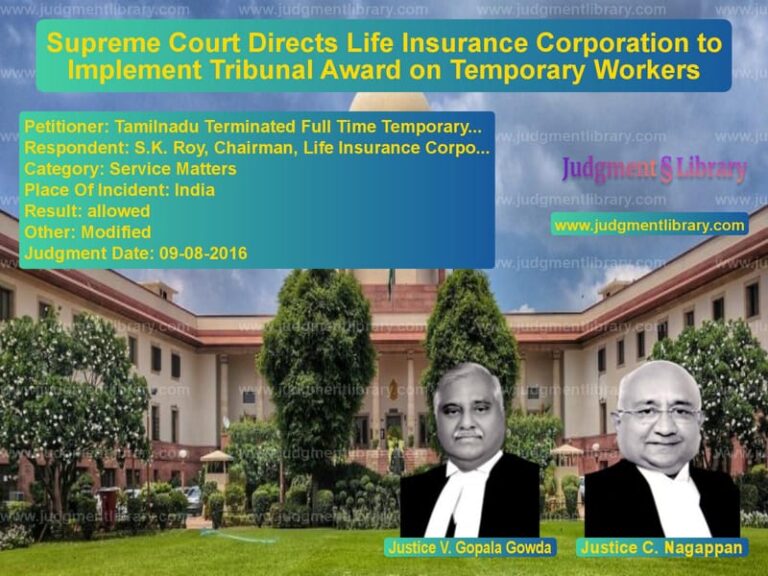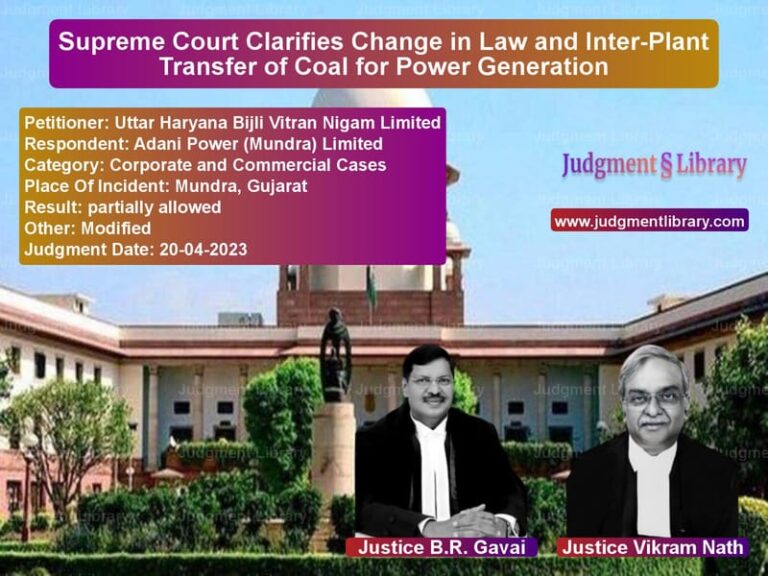Supreme Court Upholds Specific Performance in Property Dispute: Basavaraj vs. Padmavathi Case
The Supreme Court of India recently ruled in the case of Basavaraj vs. Padmavathi & Anr., addressing the execution of an agreement to sell land and the enforcement of specific performance. The case revolved around the buyer’s readiness and willingness to complete the transaction and whether the seller wrongfully refused to execute the sale deed.
Background of the Case
The dispute arose from an agreement to sell executed on March 13, 2007, where the defendant (Padmavathi) agreed to sell a parcel of land to the plaintiff (Basavaraj) for ₹12,74,000. An earnest amount of ₹3,00,000 was paid upfront, and the agreement stipulated that the sale deed would be executed by July 31, 2007.
However, when the agreed-upon date arrived, the defendant refused to complete the sale, prompting the plaintiff to issue a legal notice on November 20, 2007, demanding that the sale deed be executed. The defendant denied the execution of the agreement, leading the plaintiff to file a suit for specific performance in 2008.
Arguments by the Appellant (Basavaraj)
- The plaintiff contended that he was ready and willing to fulfill his obligations under the agreement and had attempted to tender the remaining ₹9,74,000 to the seller, who refused to accept it.
- He provided evidence that he approached the defendant multiple times in June and July 2007 with the sale consideration in cash.
- Two witnesses testified that they accompanied the plaintiff to pay the balance amount, but the defendant refused to execute the sale deed.
- He argued that the High Court erred in reversing the Trial Court’s decree, which had rightly ordered specific performance.
Arguments by the Respondents (Padmavathi & Anr.)
- The defendants denied executing the agreement to sell and claimed that the transaction was actually a loan agreement, not a sale agreement.
- They contended that the plaintiff was not financially capable of paying the balance consideration within the stipulated time.
- They also argued that the plaintiff failed to prove his financial readiness by not producing bank statements or other documents demonstrating the availability of funds.
Supreme Court’s Observations
- “The plaintiff consistently demonstrated readiness and willingness to perform his part of the agreement.”
- “Once the Trial Court has made findings on readiness and willingness, the High Court should not have interfered unless the findings were perverse.”
- “The defendant’s claim that the agreement was a loan transaction is baseless, as she admitted to executing the agreement and receiving ₹3,00,000 as earnest money.”
- “A party cannot refuse to perform a contract after receiving consideration and then claim it was not an agreement to sell.”
Final Judgment
- The Supreme Court set aside the High Court’s judgment and restored the Trial Court’s decree for specific performance.
- The plaintiff was directed to pay an additional ₹10,00,000 to the defendant to finalize the sale.
- The defendant was instructed to execute the sale deed within two weeks of receiving the payment.
- The defendant was also permitted to withdraw the ₹9,74,000 already deposited in the Trial Court.
Legal Precedents Considered
- Indira Kaur vs. Sheo Lal Kapoor (1988): Held that non-production of a passbook or accounts does not lead to an adverse inference against the plaintiff.
- J.P. Builders vs. A. Ramadas Rao (2011): Clarified that the plaintiff must prove readiness and willingness but need not demonstrate actual cash availability.
- Beemaneni Maha Lakshmi vs. Gangumalla Appa Rao (2019): Ruled that failure to produce financial documents does not negate readiness to perform the contract.
Implications of the Judgment
- This ruling reinforces that once a party enters into an agreement and accepts consideration, they cannot later deny execution.
- The Court reaffirmed that High Courts should not lightly interfere with findings of Trial Courts, particularly regarding readiness and willingness.
- The judgment provides greater protection to buyers in real estate transactions, ensuring that sellers honor agreements.
Conclusion
The Supreme Court’s decision in this case reinforces the principle that specific performance should be enforced when a valid contract exists and the buyer is willing and able to complete the transaction. The ruling highlights the importance of honoring legally binding agreements and prevents parties from unjustly repudiating contracts. This judgment sets a strong precedent in real estate contract disputes.
Petitioner Name: Basavaraj.Respondent Name: Padmavathi & Anr..Judgment By: Justice M.R. Shah, Justice B.V. Nagarathna.Place Of Incident: Karnataka.Judgment Date: 05-01-2023.
Don’t miss out on the full details! Download the complete judgment in PDF format below and gain valuable insights instantly!
Download Judgment: basavaraj-vs-padmavathi-&-anr.-supreme-court-of-india-judgment-dated-05-01-2023.pdf
Directly Download Judgment: Directly download this Judgment
See all petitions in Specific Performance
See all petitions in Property Disputes
See all petitions in Judgment by Mukeshkumar Rasikbhai Shah
See all petitions in Judgment by B.V. Nagarathna
See all petitions in allowed
See all petitions in Modified
See all petitions in supreme court of India judgments January 2023
See all petitions in 2023 judgments
See all posts in Civil Cases Category
See all allowed petitions in Civil Cases Category
See all Dismissed petitions in Civil Cases Category
See all partially allowed petitions in Civil Cases Category







